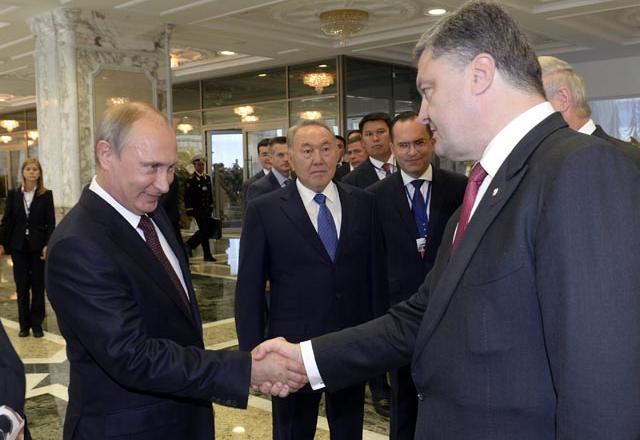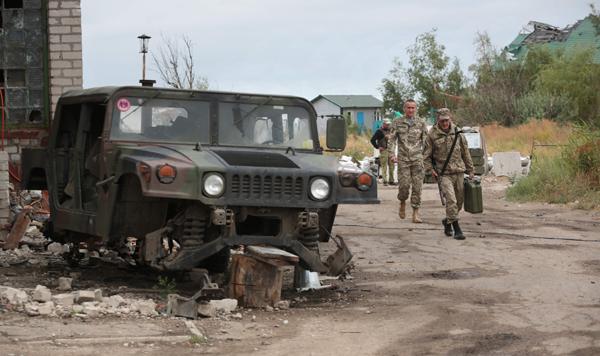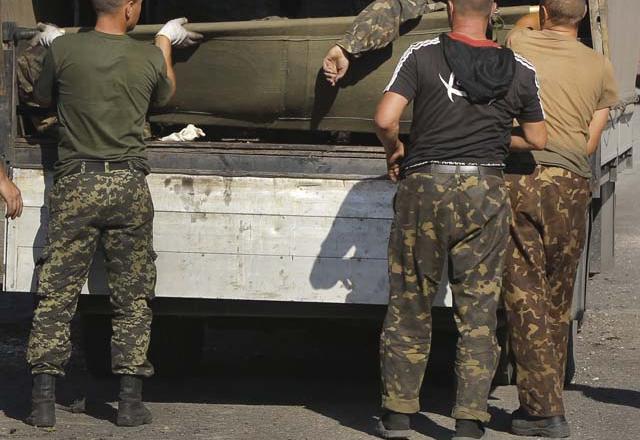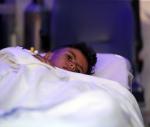You are here
Breakthrough hopes dented as Ukraine accuses Russia of new military incursion
By Reuters - Aug 27,2014 - Last updated at Aug 27,2014
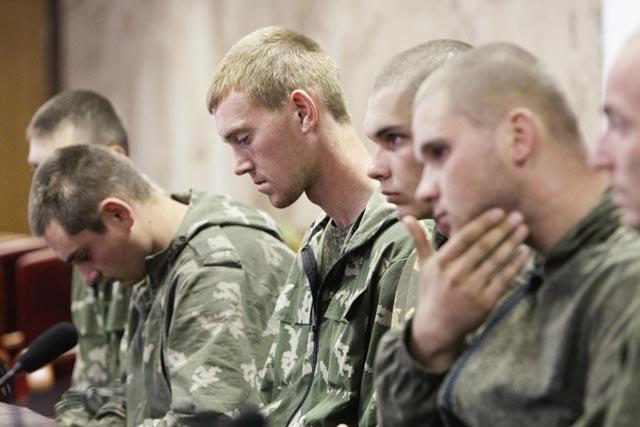
KIEV/DONETSK, Ukraine — Ukraine accused Russia of launching a new military incursion across its eastern border on Wednesday, as hopes quickly faded that Tuesday's talks between their two presidents might mark a turning point in a five-month-old crisis.
Accusations of direct Russian support for pro-Russian separatists in Ukraine have prompted Western governments to impose sanctions on Moscow, despite its vehement denials, and fanned tensions with NATO to levels not seen since the Cold War.
Ukrainian military spokesman Andriy Lysenko said a group of Russian soldiers had crossed the border in armoured infantry carriers and a truck and entered the town of Amvrosiyivka, not far from where Ukraine detained 10 Russian soldiers on Monday.
He said fighting in two other towns, Horlivka and Ilovaysk, had killed about 200 pro-Russian rebels and destroyed tanks and missile systems. Thirteen Ukrainian service personnel had been killed in the past 24 hours and 36 had been wounded.
No comment was immediately available from the Russian defence ministry on the alleged incursion. Russia denies sending weapons and soldiers to help the rebels, and says the men captured on Monday had crossed an unmarked section of the border by mistake.
Late-night talks in the Belarussian capital Minsk had appeared to yield some progress towards ending a war in which more than 2,200 people have been killed, according to the UN — a toll that excludes the 298 who died when a Malaysian airliner was shot down over rebel-held territory in July.
Ukrainian President Petro Poroshenko said he would work on an urgent “roadmap” towards a ceasefire with the rebels. Russia's Vladimir Putin said it would be for Ukrainians to work out ceasefire terms, but Moscow would "contribute to create a situation of trust".
But Wednesday's new accusations from Ukraine made clear that the poisonous dispute over Russia's role remained unresolved.
German Foreign Minister Frank-Walter Steinmeier said it was hard to tell whether the talks in Minsk marked a breakthrough.
"Perhaps not, but let's hope that this meeting was not an end of some development, but another beginning," he said.
Chancellor Angela Merkel's spokesman said the flow of Russian forces and weapons into Ukraine was a major problem and Moscow must ensure that it stops.
"It's long overdue that this border is properly secured and that all forms of military support for the separatists over this border end. Russia has a big responsibility for that," spokesman Steffen Seibert said.
Trade wars
Fighting in the east erupted in April, a month after Russia annexed Ukraine's Crimean peninsula in response to the toppling of a pro-Moscow president in Kiev.
The crisis has prompted the United States and EU to impose sanctions on Russia's finance, oil and defence sectors, and Moscow has hit back by banning most Western food imports. The trade wars threaten to tip Russia into recession and strangle economic recovery in Europe.
Russian Foreign Minister Sergei Lavrov said Moscow was not looking for a further escalation of trade tensions. "We have no interest in a confrontation or in whipping up a spiral of sanctions," he told an audience of students.
The next step would be for a “Contact Group”, comprising representatives of Russia, Ukraine, the rebels and the Organisation for Security and Cooperation in Europe, to meet in Minsk, he said without giving a time frame.
But Ukrainian foreign policy adviser Valery Chaly told reporters in Kiev that Poroshenko's declaration on a ceasefire roadmap did not mean an immediate end to the government's military offensive against the rebels.
"If there are attacks from the terrorists and mercenaries, then our army has the duty to defend the people," he said.
A rebel leader, Oleg Tsaryov, wrote on Facebook that he welcomed the outcome of the Minsk talks, but the separatists would not stop short of full independence for the regions of eastern Ukraine they call Novorossiya (New Russia).
He said he saw "a real breakthrough" in Putin's offer to contribute to the peace process.
But he added: "It must be understood that a genuine settlement of the situation is only possible with the participation of representatives of Novorossiya. We will not allow our fate to be decided behind our back...
"Now we are demanding independence. We don't trust the Ukrainian leadership and don't consider ourselves part of Ukraine. The guarantee of our security is our own armed forces. We will decide our own fate."
Further underlining Kiev's distrust of Moscow, Ukrainian Prime Minister Arseny Yatseniuk said his country needed "practical help" and "momentous decisions" from NATO at an alliance summit next month.
He said he knew of Russian plans to halt gas flows this winter to Europe, up to half of which are shipped via Ukraine. Russia's energy minister called the assertion groundless.
Russia cut off gas supplies to Ukraine in June in a dispute over pricing and debt, but Putin said after Tuesday's talks that he and Poroshenko had agreed to resume discussions.
European Energy Commissioner Guenther Oettinger said gas consultations would take place in Moscow on Friday between Russia, Ukraine and the European Union.
Related Articles
The presidents of Russia and Ukraine hold key talks Tuesday with little hopes for a breakthrough in resolving the raging conflict pitting Kiev against pro-Moscow separatist rebels.
KIEV — Ukraine on Thursday reported the heaviest rebel shelling attack in the separatist east for a year in what the president said could be
Ukraine said Russian tanks had flattened a small border town and pro-Russian rebels had made fresh gains in its east, as EU leaders signalled on Saturday they would threaten more sanctions against Moscow over the crisis.


